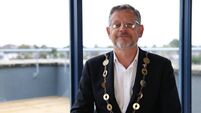We need to plug investment gaps in mental health services

ONE IN SEVEN adults will have experienced a mental health difficulty in Ireland in the past year. That’s almost half a million people — our neighbours, our colleagues, our family members, ourselves.
Thankfully these days, the message that “it’s OK not to feel OK and it’s absolutely OK to ask for help” is being shared widely.
When people do reach out for help, it’s vital that there are good quality mental health services and supports that are easily accessible to people in their local area, to help them in their recovery.
But Ireland’s mental health system is under severe strain due to decades of under-investment. Mental health staffing is still 22% below the recommended level and many services are struggling, unable to meet the need.
In Cork, 537 children were waiting to be seen by child and adolescent community mental health services at the end of August, according to HSE figures. Alarmingly, 115 of these children and young people had been waiting more than 12 months.

These delays mean that struggling families are going without support. Staff shortages are having a negative impact on people’s access to mental health services in general, for children and adults alike.
Mental Health Reform (MHR), the national coalition on mental health, has been holding public meetings across the country to hear people’s experiences of mental health services.
The feedback MHR got was very clear: People said that sitting in A&E when they’re feeling suicidal is frightening, that having to wait months for support doesn’t help, that they want to work and live a full life in their community.
They’ve also told MHR about being listened to and seeing progress, and about the support they get from their community mental health team. There have been positive stories this year when it comes to mental health, including some development in Cork like the appointment of a Peer Support Worker by the HSE to the Home Focus team in West Cork.
The Home Focus team reaches out to people with significant mental health difficulties to help them become a part of their community again. Having someone on the team who has their own experience of mental health difficulties sends a really powerful message about recovery to others going through something similar.

Despite some positive development, the overwhelming message from people is still that change is needed, that good quality services must be available all across Ireland and not just in particular areas.
If you are concerned about good mental health services, you can make your views known at the town hall meeting in Cork on Monday from 6pm-8pm in the Metropole Hotel. This meeting will be the first chance to talk to candidates about the issue of mental health, as junior minister Kathleen Lynch and other candidates from Cork North Central and Cork South Central set out their plans and gather to listen to voters’ concerns on this issue.
Between 2007 and 2012 the highest suicide rate in Ireland was in Cork City at a rate of 18.8 per 100,000 people. The average rate of suicide in Ireland was 11.4 per 100,000 people. It is vital that community based mental health services are there to support people when they need it. But services are stretched, and not fully up and running.
We understand that people with mental health difficulties need supports that help them, as a whole person, to recover their mental well-being. This requires more than just a medical approach. That’s why we have recently supported projects like setting up an allotment in Ballincollig and running a dance workshop in Kanturk for people using mental health services.

These small changes in community supports will make a big difference. But it is change in the HSE’s mental health services that is also urgently needed. It’s positive that there have been advances in the HSE mental health services within the community and that we are beginning to see different services working together. This approach needs to be continued and developed further into the future to provide the best service possible for people with mental health difficulties.
With a general election on the horizon, all candidates should have mental health on their agenda. The next government needs to take urgent action to address the resource shortfalls in the mental health services and develop new ways of providing support to meet the demand for help. People with mental health difficulties need a response from the government that helps them recover and this means easy access to good quality mental health support.













